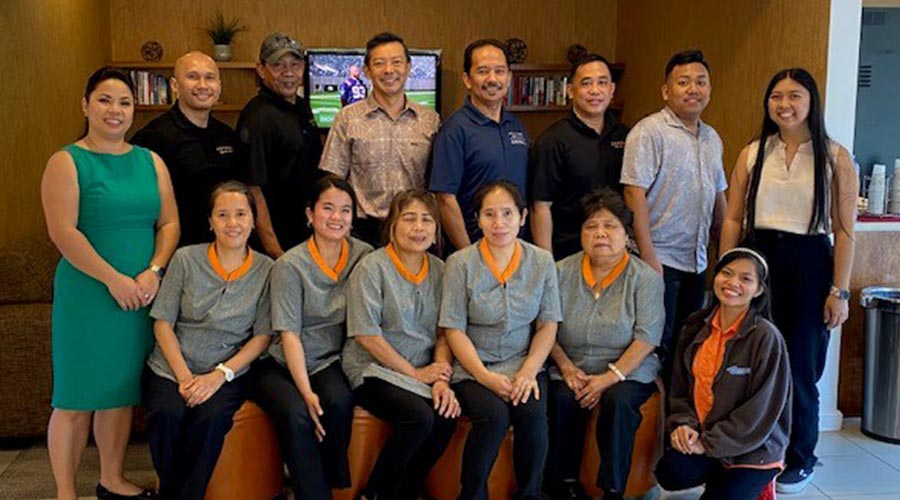
One change that’s related to both workforce and sustainability is cleaning frequency. When it comes to frequencies, housekeeping departments have had to reassess what makes sense from labor, cleaning and guest services perspectives. For some, a process that creates efficiencies for housekeeping teams also creates comfort and control for guests.
In hospitality, appearances are everything. The pandemic changed the way cleaning is done — and the way it must appear to be done. Visible cleaning and disinfecting are what guests appreciate and expect.
“The focus on disinfecting has been very strong since the pandemic,” Nagata emphasizes. “It’s important to our guests that our employees be observable” when cleaning common areas and rooms.
At Feather Falls, automatic daily cleaning service is available by request only.
“We give guests the option to request that service,” Nash says. Guests can specify what touch-ups they want, and housekeepers deliver. “It saves labor as well as washing towels and linens. That’s really helped.”
The hotels managed by Nagata have continued daily cleaning services, but linens and towels are changed out by request only or on the fourth day of the stay.
“Cleaning a guest room every day is beneficial to housekeepers in the end, so they aren’t cleaning such a heavy load,” and they can provide a fresh, clean feeling for guests, he says.
______________________________________________
Embodying the Spirit of Aloha in Imaginative Ways
Jeffrey Nagata, regional general manager at the Shoreline and Coconut Hotels in Waikiki, Hawaii, was born and raised in Hawaii and has been in the hospitality industry his entire career. After being trained at the Four Seasons in Maui, he moved to Las Vegas, where he worked at a number of resort casinos before returning home. His approach to leadership is imaginative and passionate, and that includes being aware of hotel trends while respecting the foundations of hospitality and the distinct local culture.
The culture he is building for employees and guests is an extension of an alignment with the Hawaiian culture.
“Coming to the Coconut is like going to Auntie and Uncle’s house,” he says. “You’re always welcome, and you’re always going to feel comfortable.”
The hotels, which are independent and intentionally off the beaten tourism path, offer local recommendations personalized by staff.
“It created a way for not only our employees to engage with guests, but to showcase a local island perspective,” he says. “Creating personal touches and engagements with our guests is what differentiates us.”
Cleaning as a Team
Nagata has taken the team cleaning trend and put a somewhat unconventional spin on it.
“At Coconut, the housekeepers work as a team. It may not work in every hospitality environment, but at Coconut, it works and has amazing results,” he says.
Instead of the typical solo or two-member team cleaning, all five housekeepers clean guest rooms as a group. The benefits are three-fold, Nagata says: the cleaning is done in half the time, the staff builds camaraderie and have fun together, and the guests get to engage with this unique experience.
“The housekeepers are super engaging and that’s because they have a comfort level, working together like that,” he says. “When a guest walks by, they are fantastic ambassadors of ‘Aloha.’”
Technology: Engagement Enabler
Nagata is keeping an eye on the latest hotel and cleaning technologies and innovations, with a lens of employee and guest engagement.
“As we look at technology, I ask whether it supports our employees to be more engaging, as opposed to moving responsibility away from them,” he says. “The key to hospitality, especially in Hawaii, is that face-to-face personal interaction.”
Ensuring that personal connection is part of the guest experience now and in the future is one of Nagata’s passions.
“In my career, housekeeping has been my master, and it has helped differentiate me as a leader,” he says. “For my employees, I want them to have a legacy and leave a mark, and that starts with being a master of something.”
There’s a larger labor implication, he adds. All businesses are struggling with attracting young talent — so it’s incumbent upon today’s leaders to invest in attractingand retaining their workforce.
“What are the next generation of workers going to be doing, how are we attracting them to work, and how much is work going to have to change in order to make sure we are attracting that labor?” Nagata asks.
That’s why, at his hotels, hospitality comes first.He comments that cleaning should be the baseline, but there’s more to housekeeping than just cleaning.
“What housekeepers do to go above and beyond, sharing the spirit of ‘Aloha’ with friendliness, recommendations and an active social media presence, helps create a memorable guest experience,” Nagata says.
Hotel Facility Execs Praise Talent and Sustainability
Innovating Hotel Housekeeping

 The Down and Dirty on Cleaning in Virus Season
The Down and Dirty on Cleaning in Virus Season How Surfactant Use is Expanding in Commercial Cleaning
How Surfactant Use is Expanding in Commercial Cleaning